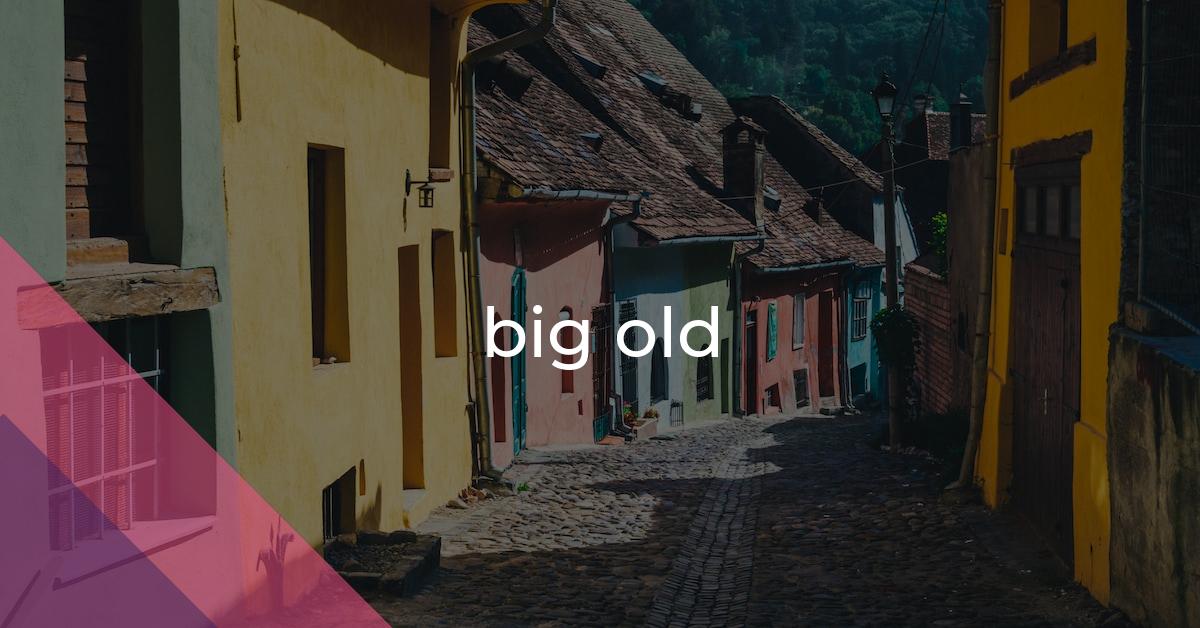big old: Idiom Meaning and Origin
What does ‘big old’ mean?
The idiom "big old" is used to emphasize the size or importance of something or someone. It is often used informally to add emphasis or exaggeration in speech or writing.

Idiom Explorer
"Large and in charge" is an idiom that means someone is in a position of power or authority, and they are confident and capable of handling their responsibilities.
The idiom "in a big way" means to do something on a large scale, with great intensity or significance.
The idiom "great deal" means a large amount or quantity of something. It is used to indicate that there is a significant or considerable extent or degree of something.
The idiom "far and away" means by a large margin or significantly. It is used to emphasize that something is the best or most outstanding compared to others.
The idiom "big wheel" refers to a person who has great power, influence, or importance in a particular field or organization.
The idiom "big talk" means to make boastful or exaggerated claims or promises, often without the intention or ability to follow through on them.
The idiom "big shot" refers to someone who is powerful, influential, or successful. It is often used to describe someone who has achieved a high status in a particular field or industry.
The idiom "big shop" refers to a large or significant event or occasion, often marked by the presence of important people or the occurrence of major activities or successes.
The idiom "big screen" refers to the large cinema screen where movies are shown. It is often used to describe the experience of watching a film in a theater rather than on a smaller screen, such as a television or computer monitor.
Linguistic Origins: Unveiling the 'Big Old' Meaning
Idioms are an important part of the English language. They add color and complexity to our everyday communication. One idiom that has become increasingly popular over the years is "big old." This idiom is a compound adjective that is used to describe something large or significant in size or age.
Unlike the conventional English adjective structure, the order of the adjectives is reversed in "big old," with "old" coming before "big." This reversal emphasizes the considerable dimensions or years of existence of the object or entity being described. It's a simple yet effective way to convey the magnitude or significance of something.
When using the idiom "big old," it can be applied to a wide range of objects or entities. For example, you might say, "I saw a big old tree in the park," to highlight the tree's imposing size or age. Or you could say, "She lives in a big old house," to emphasize the grandeur and historical significance of the residence. This idiom's versatility allows it to be used in various contexts, whether describing physical structures, animals, or even abstract concepts.
The origins of the idiom "big old" are difficult to trace definitively. Idioms often develop naturally within a language, making it challenging to pinpoint their exact origins. However, it is likely that "big old" emerged as a colloquialism in American English, given its widespread usage and recognition within the United States.
One of the reasons why the idiom "big old" has become so popular is its ability to create vivid and expressive imagery. By combining two seemingly simple adjectives with contrasting qualities, "big old" evokes a sense of grandeur and permanence. This dynamic interplay of opposing concepts adds depth to the language and allows for the creation of mental landscapes that paint a more vibrant picture in the minds of listeners or readers.
With its rich history and continued usage, the idiom "big old" has earned its place among the countless colorful expressions that populate the English language. It provides a unique way to communicate the magnitude or significance of objects or entities. While we may not know the exact origins of this idiom, its enduring presence in everyday speech is a testament to its enduring power and versatility. Exploring idioms like "big old" allows us to delve deeper into the possibilities and intricacies of the English language.
Now let's talk about how the idioms "big ol'" and "big ole" are related to the idiom "big old". Both "big ol'" and "big ole" are variations of "big old" and are used to convey the same meaning. These variations are the result of informal and colloquial speech, where words are often shortened or modified for brevity or emphasis.
In spoken language, it is not uncommon for people to drop the "d" sound in "old" and say "ol'" or "ole" instead. For example, someone might say, "I saw a big ole tree in the park," or "She lives in a big ol' house." These variations maintain the same meaning as "big old" but add a touch of informality and familiarity to the language.
These variations, like "big old," can be used to describe objects or entities in various contexts. Whether it's a "big ole car" or a "big ol' problem," these idioms allow us to communicate size or age in a more playful and conversational way.
Idioms like "big old," "big ol'," and "big ole" are valuable tools in our language. They allow us to add color and depth to our communication while conveying the magnitude or significance of objects or entities. While the precise origins of these idioms may remain a mystery, their enduring presence and usage speak to their power and versatility. So the next time you want to describe something large or significant, try using the idiom "big old" or one of its variations. You'll be speaking the language of idioms and adding a playful touch to your words.
Example usage
Here are three examples of how the idiom "big old" can be used in a sentence:
- She lives in a big old house on the hill.
- I found a big old book in the attic.
- We drove down the highway in his big old truck.
The idiom "big old" is typically used to emphasize the size or age of something, often in a nostalgic or affectionate tone. It is commonly used to describe houses, books, or vehicles, highlighting their large size or old-fashioned nature. The phrase "big old" can be interpreted as a single unit, where "big" emphasizes the size and "old" emphasizes the age or vintage quality of the object being described.
More "colloquial" idioms



